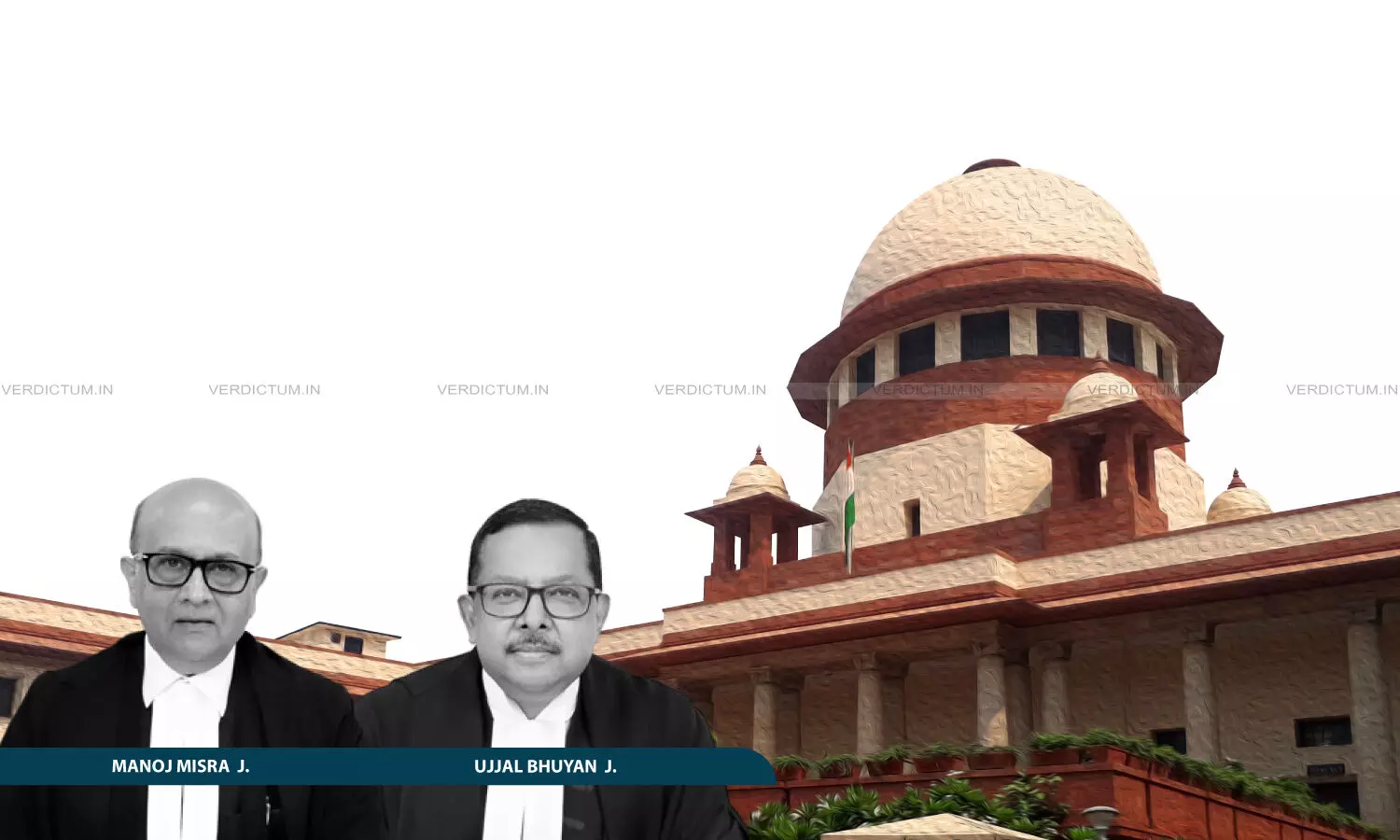
Justice Manoj Misra, Justice Ujjal Bhuyan, Supreme Court
Mere Existence Of Arbitration Clause In Contract Between Parties Not Sufficient Ground To Quash Criminal Case: Supreme Court
 |
|The Court said that it was incumbent on the High Court to consider the allegations in the FIR and materials collected during the investigation before quashing criminal proceedings
The Supreme Court has held that the mere existence of an arbitration clause between parties is not a valid ground to quash criminal proceedings if the basic ingredients of an offence are made out. The Court set aside a High Court order which had quashed a criminal case solely on the ground that the dispute arose out of a commercial contract that contained an arbitration clause.
A Bench of Justice Manoj Misra and Justice Ujjal Bhuyan observed, “We are of the view that the order passed by the High Court cannot be sustained for the simple reason that it does not advert to the allegations made in the FIR and the materials collected by the investigating agency during investigation.”
The Court added, “It is well-settled that mere existence of an arbitration clause in the contract between the parties is not a sufficient ground for quashing the criminal proceedings if the necessary ingredients of a criminal offence are made out from the allegations and the materials collected during the course of investigation or inquiry.”
Senior Advocate Ravindra Singh appeared for the Appellant, while Advocate Rahul Singh Chauhan represented the Respondents.
Brief Facts
The Appellant had approached the High Court seeking the quashing of a criminal case that was registered against him in connection with a business transaction. In the application under Section 482 CrPC, it was contended that the dispute was purely civil in nature and that the contract between the parties contained an arbitration clause, rendering criminal proceedings unnecessary and abusive of process.
The High Court accepted that argument and quashed the FIR, the chargesheet, and all proceedings. The Appellant before the Supreme Court challenged that order, arguing that the High Court had not even looked into the nature of the allegations or considered whether the ingredients of the alleged offence were disclosed.
Reasoning of the Court
The Court noted that once a chargesheet had been filed and cognizance had been taken, the High Court was under a duty to examine whether a prima facie case had been made out before invoking its inherent jurisdiction to quash proceedings.
The Court observed, “Before taking a decision to quash the proceedings arising from the FIR, it was incumbent upon the High Court in exercise of its jurisdiction under Section 482 CrPC to advert to the allegations made in the FIR and the materials collected during the course of investigation so as to find out whether a prima facie case is made out or not to proceed against the accused.”
Referring to established precedent, the Court stated, “It is well-settled that mere existence of an arbitration clause in the contract between the parties is not a sufficient ground for quashing the criminal proceedings if the necessary ingredients of a criminal offence are made out from the allegations and the materials collected during the course of investigation or inquiry.”
The Court to the decision in Trisuns Chemical Industry v. Rajesh Agarwal (1999), wherein the Court held that criminal prosecution cannot be thwarted merely because the dispute may also have a civil flavour. The Court reiterated, “Quashing of a criminal complaint or proceedings under Section 482 CrPC should be exercised sparingly and only when the complaint does not disclose any offence or is frivolous, vexatious or oppressive.”
The Court found that the High Court’s order was a non-speaking one, passed without engaging with the record or the facts of the case. The Bench noted, “The order under challenge does not advert to any material collected during investigation, nor does it record any conclusion as to whether the basic ingredients of the alleged offence are made out.”
Accordingly, the Court allowed the appeal and restored the quashing petition before the High Court for fresh adjudication.
Cause Title: Digambar Pathak v. State Of Uttar Pradesh & Ors. (Special Leave Petition (Criminal) No.7341 of 2025)
Appearance:
Appellant: Senior Advocate Ravindra Singh; AoR Aniket Vijay Seth; Advocates Vibhav Srivastava, Raman Yadav, Ujjwal Sinha, Aashi Arora, Priyam Kaushik
Respondents: AoR Sakshi Kakkar; Advocates Rahul Singh Chauhan, Mrigank Mishra